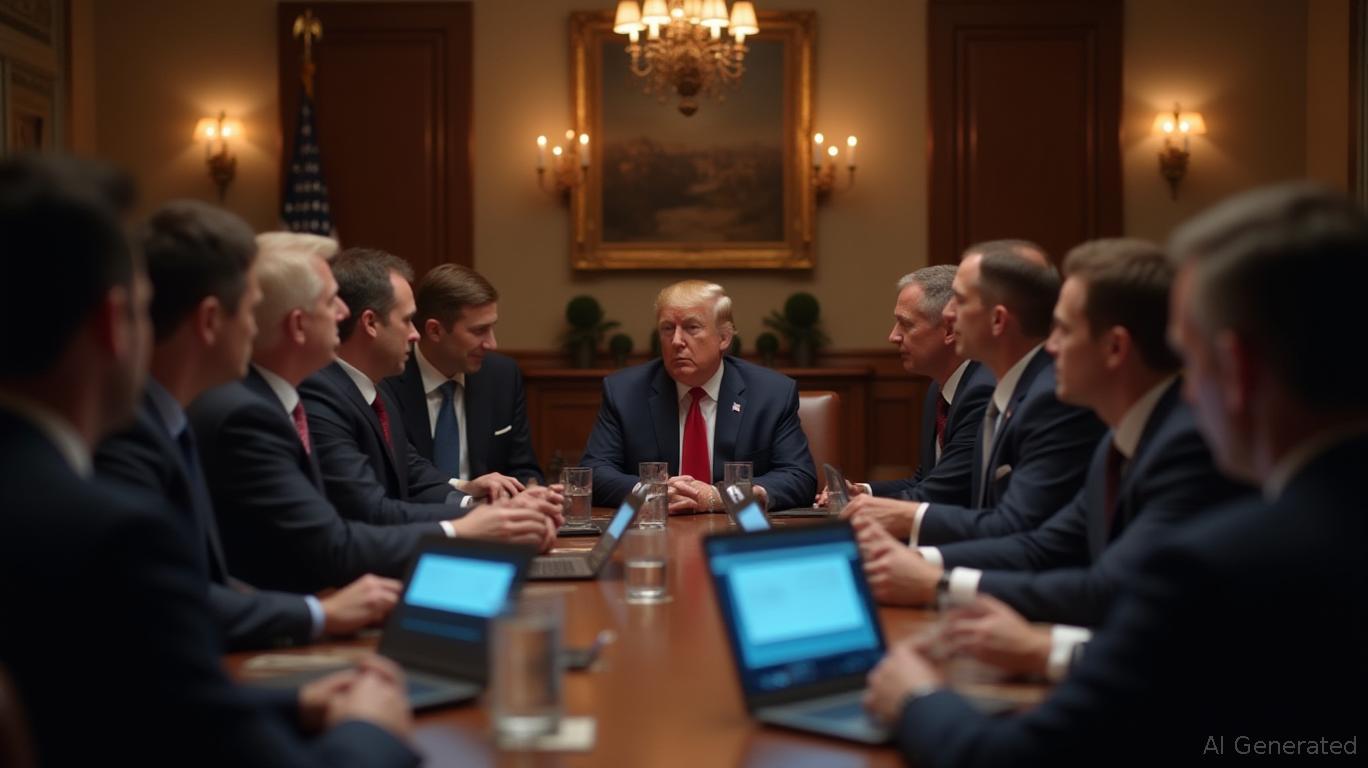XRP News Update: Silicon Valley and Crypto Investors Back Trump’s Ballroom in Support of Pro-Digital Policies
- Trump's $300M White House ballroom, funded by crypto firms and Big Tech, sparks debates over corporate influence and transparency in political donations. - Ripple, Tether, Coinbase, and YouTube (via $22M) join Amazon/Google/Meta in backing the project, signaling crypto/tech sector's strategic alignment with Trump's pro-digital policies. - Critics argue donor recognition (plaques) blurs ethical lines, while preservationists warn the 90,000-sq-ft addition risks damaging the White House's historic design. -
President Donald Trump's initiative to build a privately funded ballroom at the White House has attracted widespread attention, not only due to the project's magnitude but also because of its diverse group of donors, which includes leading cryptocurrency companies and major technology corporations. According to White House representatives, the $300 million project—which will see a portion of the East Wing demolished to make way for a 90,000-square-foot ballroom—is being paid for entirely through private contributions and the president's own resources. The participation of firms such as Ripple,
This undertaking has become a symbol of the cryptocurrency sector’s increasing alignment with the Trump administration. Executives from Ripple, Coinbase, and Tether were present at a prominent fundraising event for the ballroom, highlighting the digital asset industry’s efforts to build relationships with government officials. Ripple’s involvement, in particular, signals its growing influence in Washington, following previous record-breaking donations to Trump’s inauguration, as noted by

Major technology companies have also made notable contributions. Amazon, Apple, Google, Microsoft, and Meta are among the donors, with Alphabet’s $22 million donation reportedly linked to a settlement that resolved Trump’s lawsuit over his YouTube account suspension after January 6, 2021, as reported by
The scale of the ballroom has drawn criticism from preservationists and historians, who caution that such a large addition could compromise the White House’s historic architecture. The National Trust for Historic Preservation has requested a public review, arguing that the project "could irreversibly alter the carefully balanced classical design" of the residence, the
Political commentators interpret the project as a calculated effort by the crypto industry to strengthen its relationship with an administration supportive of digital assets. Trump’s recent pardons of crypto figures, such as Binance’s Changpeng Zhao, and his appointment of a pro-crypto SEC chair have already shifted the regulatory landscape. With a new market structure bill close to completion, industry leaders expect even more favorable policies, as previously mentioned by Crypto.News. Still, the direct financial involvement of crypto companies in a White House project marks a significant shift from traditional lobbying, prompting concerns about influence and responsibility, as earlier highlighted by Coin Edition.
As the ballroom approaches its expected completion in 2029, debates about its impact on governance and the relationship between corporations and politics are set to grow. For now, the project highlights the changing balance of power among Silicon Valley, Wall Street, and the White House.
Disclaimer: The content of this article solely reflects the author's opinion and does not represent the platform in any capacity. This article is not intended to serve as a reference for making investment decisions.
You may also like
Eightco’s WLD Staking Jumps 3% as Company Moves Focus from Biometric Disputes to Blockchain Infrastructure
- Eightco's 1.3B WLD stake drove a 3% price surge as the firm shifts focus from biometric data to blockchain infrastructure projects. - The disclosure highlights institutional crypto ownership trends while distancing from WLD's controversial data monetization model. - Intuit's $100M+ OpenAI partnership boosted shares 3.4% by integrating AI financial tools into ChatGPT and enterprise platforms. - The deal underscores AI-driven fintech innovation, positioning Intuit against competitors expanding generative A

Cardano News Update: Hoskinson's Wager Against Major Holder Sell-Offs—Is ADA's $0.50 Floor at Risk?
- Cardano (ADA) stabilized above $0.50 amid whale selling and Charles Hoskinson's $200M investment in Trump-linked American Bitcoin . - Over 4 million ADA dumped weekly by large holders, signaling volatility as Hoskinson defends Bitcoin-AI synergy potential. - ADA's 41% lower trading volume and 3% open interest drop reflect reduced speculation despite technical support at $0.50. - Whale activity and stagnant $240M TVL highlight market skepticism, with Hoskinson attributing DeFi challenges to low user engag

Solana News Today: Solana Challenges $130 Support Level: Will ETF Inflows Offset Negative Market Trends?
- Solana (SOL) tests $130 support as price falls below $140, with technical indicators signaling bearish consolidation below key moving averages and resistance at $136. - Institutional adoption accelerates via VanEck's U.S. spot Solana ETF, managed by SOL Strategies through its Orangefin validator node, joining Bitwise and Grayscale in attracting $382M inflows. - Price remains range-bound near $155 amid mixed signals: ETF inflows provide partial support, but RSI/MACD remain bearish, with $162 breakout pote

Ethereum Updates Today: U.S. Paves Way for Banks to Offer Crypto Services Following Change in Blockchain Fee Regulations
- U.S. banks can now hold crypto on balance sheets to pay blockchain fees, per OCC guidance, easing crypto service integration. - Policy clarifies permissible use of assets like ETH for gas fees, requiring "reasonable" reserves and compliance with safety standards. - Trump-era crypto-friendly reforms, including the GENIUS Act, aim to position the U.S. as a global crypto innovation leader. - Major banks accelerate crypto adoption, expanding custody partnerships and stablecoin projects amid regulatory clarit
